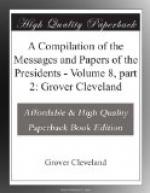The great revolution in human affairs which has brought into existence, nearly at the same time, eight sovereign and independent nations in our own quarter of the globe has placed the United States in a situation not less novel and scarcely less interesting than that in which they had found themselves by their own transition from a cluster of colonies to a nation of sovereign States. The deliverance of the Southern American Republics from the oppression under which they had been so long afflicted was hailed with great unanimity by the people of this Union as among the most auspicious events of the age. On the 4th of May, 1822, an act of Congress made an appropriation of $100,000 “for such missions to the independent nations on the American continent as the President of the United States might deem proper.” In exercising the authority recognized by this act my predecessor, by and with the advice and consent of the Senate appointed successively ministers plenipotentiary to the Republics of Colombia, Buenos Ayres, Chili, and Mexico. Unwilling to raise among the fraternity of freedom questions of precedency and etiquette, which even the European monarchs had of late found it necessary in a great measure to discard, he dispatched these ministers to Colombia, Buenos Ayres, and Chili without exacting from those Republics, as by the ancient principles of political primogeniture he might have done, that the compliment of a plenipotentiary mission should have been paid first by them to the United States. The instructions, prepared under his direction, to Mr. Anderson, the first of our ministers to the southern continent, contain at much length the general principles upon which he thought it desirable that our relations, political and commercial, with these our new neighbors should be established for their benefit and ours and that of the future ages of our posterity. A copy of so much of these instructions as relates to these general subjects is among the papers now transmitted to the House. Similar instructions were furnished to the ministers appointed to Buenos Ayres, Chili, and Mexico, and the system of social intercourse which it was the purpose of those missions to establish from the first opening of our diplomatic relations with those rising nations is the most effective exposition of the principles upon which the invitation to the congress at Panama has been accepted by me, as well as of the objects of negotiation at that meeting, in which, it was that our plenipotentiaries should take part.
The House will perceive that even at the date of these instructions the first treaties between some of the southern Republics had been concluded, by which they had stipulated among themselves this diplomatic assembly at Panama. And it will be seen with what caution, so far as it might concern the policy of the United States, and at the same time with what frankness and good will toward those nations, he gave countenance to their design of inviting the United States to this




